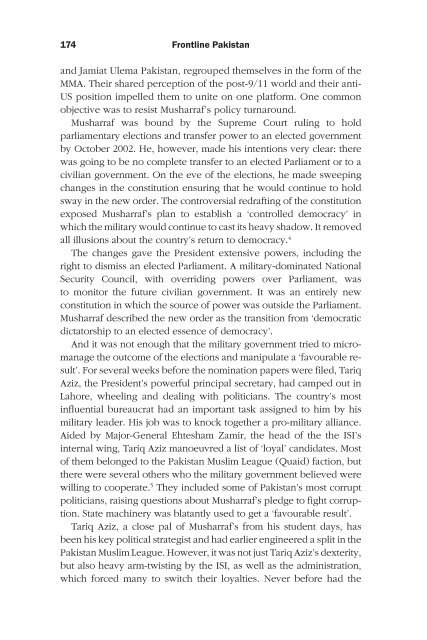Frontline Pakistan : The Struggle With Militant Islam - Arz-e-Pak
Frontline Pakistan : The Struggle With Militant Islam - Arz-e-Pak
Frontline Pakistan : The Struggle With Militant Islam - Arz-e-Pak
Create successful ePaper yourself
Turn your PDF publications into a flip-book with our unique Google optimized e-Paper software.
1 <strong>Frontline</strong> <strong><strong>Pak</strong>istan</strong><br />
and Jamiat Ulema <strong><strong>Pak</strong>istan</strong>, regrouped themselves in the form of the<br />
MMA. <strong>The</strong>ir shared perception of the post-9/11 world and their anti-<br />
US position impelled them to unite on one platform. One common<br />
objective was to resist Musharraf’s policy turnaround.<br />
Musharraf was bound by the Supreme Court ruling to hold<br />
parliamentary elections and transfer power to an elected government<br />
by October 2002. He, however, made his intentions very clear: there<br />
was going to be no complete transfer to an elected Parliament or to a<br />
civilian government. On the eve of the elections, he made sweeping<br />
changes in the constitution ensuring that he would continue to hold<br />
sway in the new order. <strong>The</strong> controversial redrafting of the constitution<br />
exposed Musharraf’s plan to establish a ‘controlled democracy’ in<br />
which the military would continue to cast its heavy shadow. It removed<br />
all illusions about the country’s return to democracy. 4<br />
<strong>The</strong> changes gave the President extensive powers, including the<br />
right to dismiss an elected Parliament. A military-dominated National<br />
Security Council, with overriding powers over Parliament, was<br />
to monitor the future civilian government. It was an entirely new<br />
constitution in which the source of power was outside the Parliament.<br />
Musharraf described the new order as the transition from ‘democratic<br />
dictatorship to an elected essence of democracy’.<br />
And it was not enough that the military government tried to micromanage<br />
the outcome of the elections and manipulate a ‘favourable result’.<br />
For several weeks before the nomination papers were filed, Tariq<br />
Aziz, the President’s powerful principal secretary, had camped out in<br />
Lahore, wheeling and dealing with politicians. <strong>The</strong> country’s most<br />
influential bureaucrat had an important task assigned to him by his<br />
military leader. His job was to knock together a pro-military alliance.<br />
Aided by Major-General Ehtesham Zamir, the head of the the ISI’s<br />
internal wing, Tariq Aziz manoeuvred a list of ‘loyal’ candidates. Most<br />
of them belonged to the <strong><strong>Pak</strong>istan</strong> Muslim League (Quaid) faction, but<br />
there were several others who the military government believed were<br />
willing to cooperate. 5 <strong>The</strong>y included some of <strong><strong>Pak</strong>istan</strong>’s most corrupt<br />
politicians, raising questions about Musharraf’s pledge to fight corruption.<br />
State machinery was blatantly used to get a ‘favourable result’.<br />
Tariq Aziz, a close pal of Musharraf’s from his student days, has<br />
been his key political strategist and had earlier engineered a split in the<br />
<strong><strong>Pak</strong>istan</strong> Muslim League. However, it was not just Tariq Aziz’s dexterity,<br />
but also heavy arm-twisting by the ISI, as well as the administration,<br />
which forced many to switch their loyalties. Never before had the













